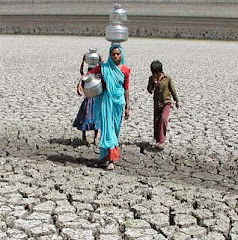Most companies operating in water-intensive sectors including utilities and computer-chip makers are failing to provide investors with enough information on water-related risks, a report has warned.
Also, investors have almost no idea how their supply chains could be hit by water shortages in the future in several cases, the report -- 'Murky Waters: Corporate Reporting on Water Risk' -- prepared by sustainable investor group CERES and financial services firm UBS, states.
Even though most of these publicly-traded companies depend on water, they do not adequately disclose their financial risks to droughts and future regulations, even as water scarcity problems mount across the world.
The report, released last month, assessed the water-related disclosures of 100 of the world's largest publicly traded companies operating in the food, drink, electricity, mining, oil and gas, semiconductor, chemicals and construction industries.
It scored the companies based on five key categories of disclosure: water accounting, risk assessment, direct operations, supply chain and stakeholder engagement.
Puting the companies' water policies on a scale of up to 100, the report found that even the best-performing firms like beverage giant Diageo, Swiss mining company Xstrata and US electricity provider Pinnacle West, scored not more than 43 points. Eighty of the 100 companies scored fewer than 30 points.
Overall, several companies did not include any information on water risks and performance in their financial filings and provided no data on how water shortages could affect facilities operating in water-stressed regions.
Non-availability of water has emerged as a formidable business risk across the world. Poor water availability as well as an increase in its procurement cost are predicted with increasing frequency and climate change and poor management of water resources are expected to exacerbate the problem of scarcity.
CERES, which is a Boston-based coalition of investors with $8 trillion USD under management, used information collected by Bloomberg LP from corporate reports and financial filings of beverage, chemicals, electric power, food, homebuilding, mining, oil and gas and semiconductor companies. UBS analyzed the data for CERES. Regulatory, reputational and litigation risks related to water supply were also looked into.
The report states that not even one company from the 100 selected had provided detailed water data on its supply chains, despite the fact that many of them operate global supply chains with sizeable water footprints across several areas of the world that are at high risk from the increased incidence of droughts.
It cites some recent incidents where businesses have been affected by regional water shortages. For instance, the drought in California last year reportedly cost the state's agricultural industry $1 billion USD (£640 million) and led to the loss of an estimated 21,000 jobs. Similarly, the 2007-08 drought in Georgia increased costs for energy firm Southern Co by $33 million as it was forced to replace falling hydroelectric power output with more costly fossil fuel-based power.
Monday, March 15, 2010
World's leading companies not forthcoming on water-related risk disclosures: Report
Subscribe to:
Post Comments (Atom)

.jpg)



No comments:
Post a Comment